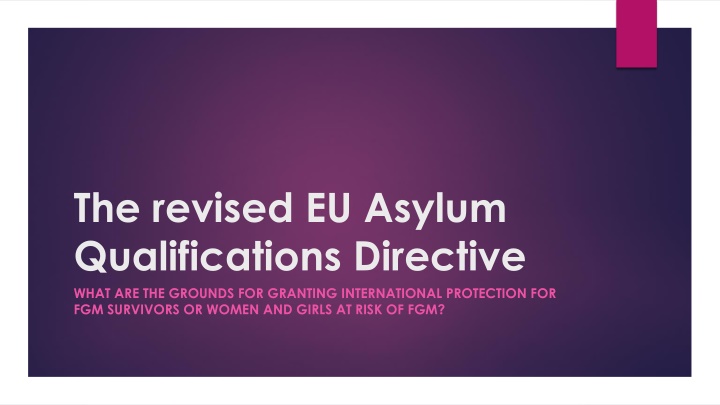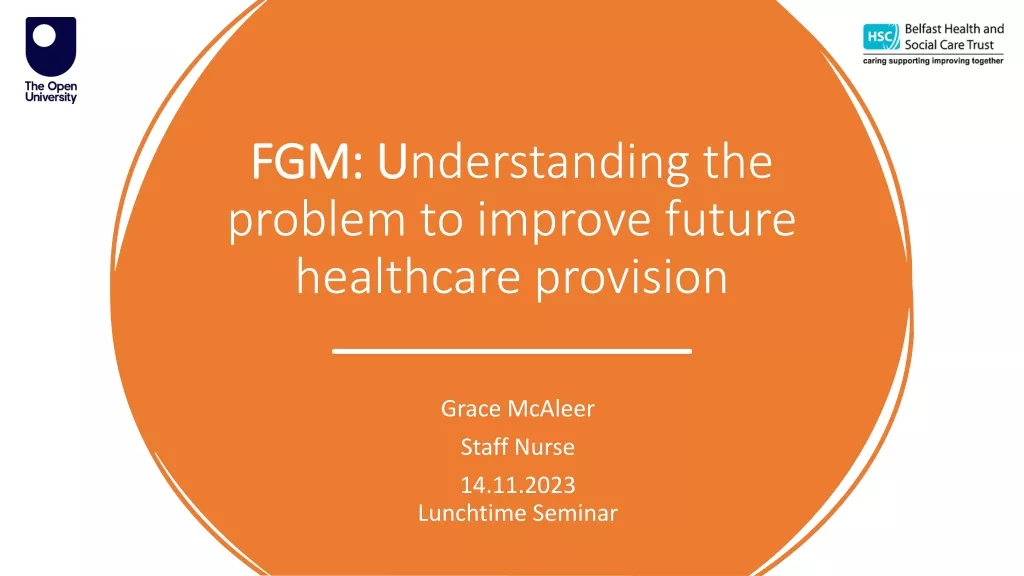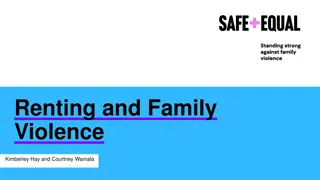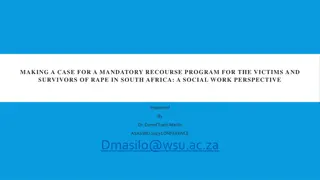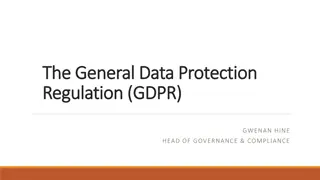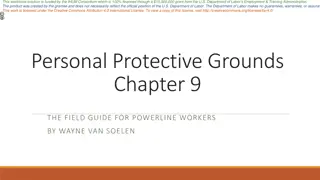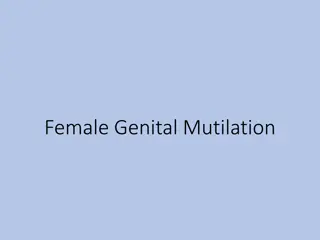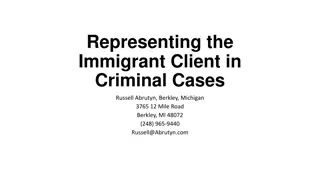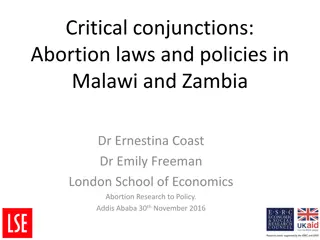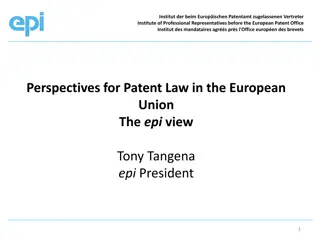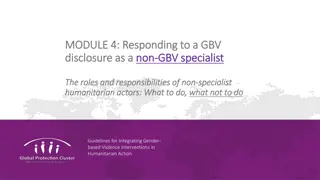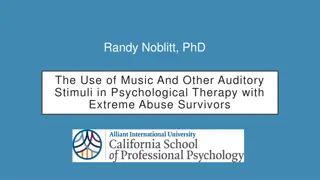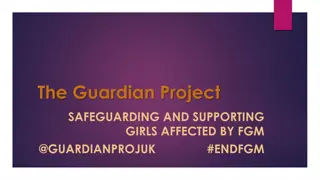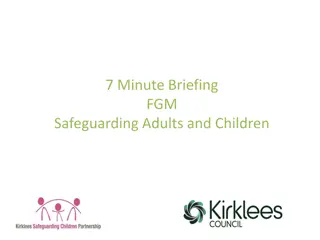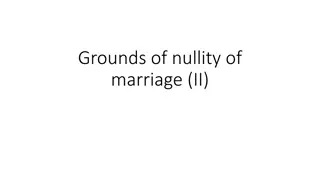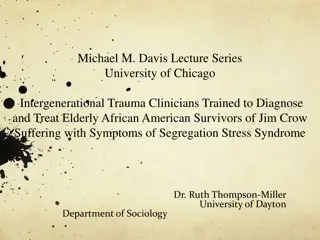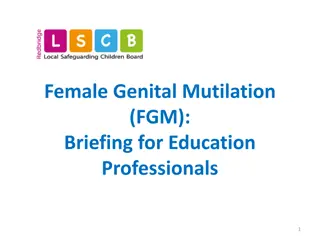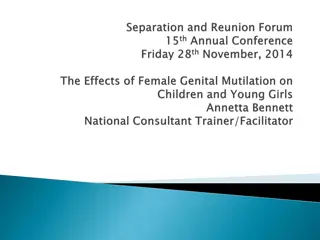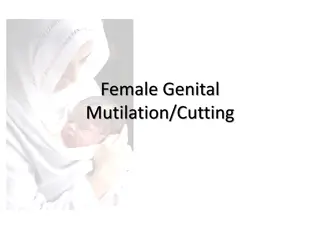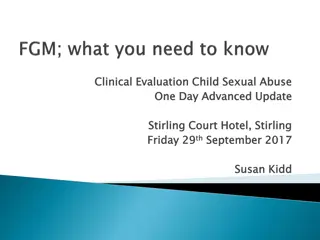Grounds for Granting International Protection to FGM Survivors
The revised EU Asylum Qualifications Directive clarifies grounds for granting international protection to FGM survivors and those at risk. Women and girls facing persecution or the threat of FGM are eligible for protection. Gender-based persecution, particularly on the basis of FGM, must be considered in the asylum process. Acts of persecution include gender-specific violence like FGM. Authorities should cooperate with applicants, especially on sensitive topics. Vulnerable individuals like minors and victims of sexual violence are given special consideration.
Download Presentation

Please find below an Image/Link to download the presentation.
The content on the website is provided AS IS for your information and personal use only. It may not be sold, licensed, or shared on other websites without obtaining consent from the author.If you encounter any issues during the download, it is possible that the publisher has removed the file from their server.
You are allowed to download the files provided on this website for personal or commercial use, subject to the condition that they are used lawfully. All files are the property of their respective owners.
The content on the website is provided AS IS for your information and personal use only. It may not be sold, licensed, or shared on other websites without obtaining consent from the author.
E N D
Presentation Transcript
The revised EU Asylum Qualifications Directive WHAT ARE THE GROUNDS FOR GRANTING INTERNATIONAL PROTECTION FOR FGM SURVIVORS OR WOMEN AND GIRLS AT RISK OF FGM?
Whats new? The grounds for granting international protection have been clarified The asylum decision-making process is to be made more robust The access to rights and integration measures for beneficiaries of international protection is to be facilitated
Provisions relating to FGM Women and girls with a well-founded fear of persecution or facing the risk of suffering FGM are eligible for international protection. Parents fearing persecution because they refuse to allow for their child to undergo FGM are eligible for international protection. FGM survivors qualify for subsidiary protection, as the criteria include serious harm (ex. torture or inhuman or degrading treatment). Issues related to the applicant s gender (ex. risk of FGM) must be given due consideration in the asylum decision-making process. The best interests of the child must be prioritised throughout the process.
FGM as a grounds for persecution on the basis of gender Persecution on the basis of membership of a particular social group includes gender, which needs to be considered in the asylum process. The assessment must consider the individual position and personal circumstances, i.e. background, gender and age. Girls are particularly vulnerable, as well as women and girls from specific ethnic groups, countries and regions.
FGM as an act of persecution The definition of acts of persecution includes sexual violence and acts of a gender-specific and child- specific nature. UNHCR guidance on refugee claims relating to FGM recognises it as a form of gender-based violence amounting to persecution. UNHCR guidelines on child asylum claims state that FGM can be seen as a form of child-specific persecution.
Cooperation of the asylum authority with the applicant Asylum authorities are required to cooperate with the applicant to asses their asylum application. Especially important in the case of taboo topics or issues requiring trust, such as FGM. Essential when the best interests of the child are at stake.
Children and victims of sexual violence as vulnerable persons The situation of vulnerable persons, such as minors, pregnant women, single parents with minor children, persons who had been subjected to physical or sexual violence and the best interests of the child must be taken into account in the asylum application process. Women and girls victims or at risk of FGM fall under this definition.
Child-specific forms of persecution and the best interests of the child Applications from children and relating to child-specific forms of persecution are to be given special consideration by asylum authorities.
Cessation of protection A refugee cannot have their protection withdrawn if they are able to provide compelling reasons, based on past persecution, for refusing to return to their country of nationality. Especially important for FGM survivors, as FGM is a continuous form of harm, which women may fear being subjected to again or continue to suffer the consequences of.
Right to family unity The principle of family unity must be upheld. If a child is granted refugee status on the basis of risk of FGM, her parents should receive derivative refugee status to uphold the principle. If a child in a family fears FGM and lodges her own claim, the best interests of the child must be determined and the need for family unity to be weighed up against that.
Proper training of staff The staff in charge of implementing the directive must be properly trained and bound by the confidentiality principle. Special focus on: gender-sensitivity, confidentiality of personal information and knowledge of the provisions of the revised directive.
Exercise Advise an asylum seeker who has fled her country with her two daughters based on the fear of them having to undergo FGM. She is herself an FGM survivor and she does not want her children to suffer the same fate. Which international protection measures apply to her children and which ones to her? Which elements of the Qualifications Directive support her case? Consider how best to communicate these considerations to the asylum seeker. List the steps she needs to take to lodge an asylum claim and consider how your organisation can assist her at the different stages.
